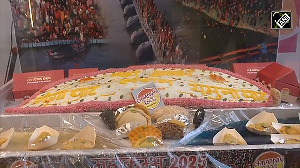The Vijay Kelkar task force on direct and indirect taxes on Friday recommended three slabs of customs duties, including zero per cent duty for life savings drugs and 10 per cent for raw materials and intermediate goods within two years.
Setting the roadmap for tax reforms, the Kelkar panel in its report submitted to Finance Minister Jaswant Singh on Friday, proposed that zero, 10 and 20 per cent customs duty slabs in the next two years should be modified to 5, 8 and 10 per cent levels by 2006-07.
The panel also proposed special import regime for petroleum products.
For the small scale industries, the panel recommended cleansing of the duty structure and steps for minimising harassment and to provide that no arrests can be made without magisterial approval.
Describing it as the heart of the report, the task force also recommended complete automation and introduction of IT in customs and excise departments by January 1, 2004, in a bid to reduce transaction cost and simplify procedures.
Kelkar told reporters that the panel has recommended a cut in import duty on crude oil from 15 per cent in 2003-04 to 8 per cent which may further be reduced to 5 per cent in 2004-05.
For petroleum products, the panel proposed the duty regime of 15 per cent by 2003-04 which would be further reduced to 10 per cent by 2004-05.
The earlier consultation paper on indirect taxes had recommended reduction of duty on crude oil to 10 per cent and 15 per cent on petroleum products. Now these have been reduced by 2 per cent on crude oil.
For select consumer durables, Kelkar panel proposed 20 per cent customs duty saying it was the best international practice, including the one in east Asia.
The customs duty structure will have to take into account the fact that status of a good lies in the eye of the beholder, he said adding tractor is an intermediate product for farmers but others regard it as a final product.
He said every district will have tax clinic by 2003.
On Central Excise duty, the 200-page final report on indirect taxes recommended central excise duty structure of zero per cent for life saving drugs, security and food items, 6 per cent for processed food products and matches, 14 per cent standard rate for all items and 20 per cent for motor vehicles, air conditioners and aerated water.
It prescribed separate rates for tobacco products and its substitutes like pan masala.
On textiles, he proposed a duty of 16 per cent till 2003-04 to be reduced to 14 per cent in 2004-05. On all fibres and yarns, raising duties on cotton yarn from 8 per cent to 14 per cent and bringing down duty rates on polyester filament yarn, were proposed.
The duty on PFY is to be brought down to 14 per cent in four instalments.
A uniform duty of 12 per cent on all fabrics knitted or woven which are not processed, has been suggested till 2004-05.
The report on direct taxes is believed to have watered down some of the recommendations pertaining to housing loans and other exemptions in personal income tax. Details are awaited.
Earlier reports stated that following the widespread criticism within the ruling Bharatiya Janata Party, the Kelkar panel on tax reforms would submit water down the final reports on direct tax and indirect taxes, particularly on the politically sensitive issue of elimination of incentives for housing in personal Income Tax.
Sources said Kelkar was likely to take the middle path on the issue, keeping in mind the flak the government had received at the hands of BJP and the middle class, sources said.
Finance Minister Jaswant Singh has already indicated that he would strive for a balanced approach while moving towards softer interest regime by providing differential rate of interest for pensioners and the retired employees and hence tax exemptions provided to senior citizens are likely to be continued.






 © 2025
© 2025